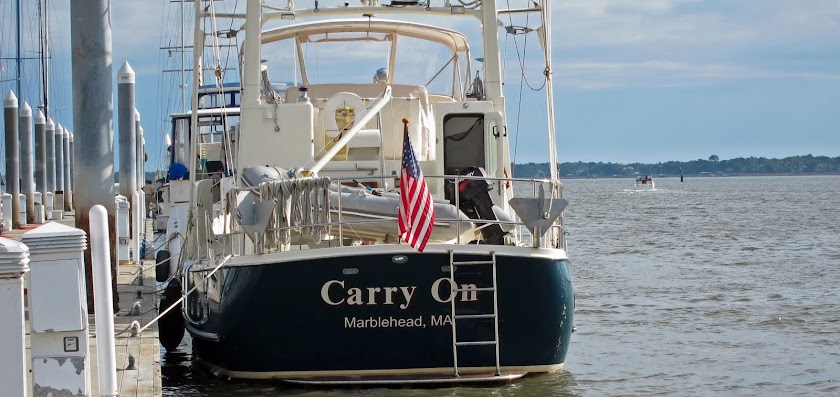It's always tricky to find a good weather window for a trip that will last more than 24 hours and cover a lot of mileage, as when traveling off shore from Ft Lauderdale to the north Florida border. We, Paul mostly, had done his homework, using several marine weather websites, including NOAA, and a paid weather router. And so we finally decided to cast off from our dock in Ft Lauderdale on the monday after Easter-- uh, that would be April 1, otherwise known as, well, you guessed it already.
We knew it would be rough getting out to the Gulf Stream from Port Everglades and it was, but once in the stream, we were moving well and it was comfortable enough, and we were into a period which the forecasts all agreed would be seas of 1-2 ft. So we figured we had paid our dues and set our course for Port Canaveral. Needless to say, conditions were not as forecast and we were treated to disorganized and high waves, at short intervals. Nasty stuff, with heavy spray and much discomfort for the crew. All this was compounded by fuel transfer issues, which finally caused us to head for St Augustine with only one engine. We would spend some period of each day the rest of the week, as this problem cascaded from one thing to another. After a big cleanup and a fuel polishing in Charleston, we have put that issue to bed.
A day or two later, when travel became normal again, to keep things in perspective, Paul read out loud to me the following passage from Blackett's War by Stephen Budiansky, ppg 151-152, describing the hastily built corvettes, used as escort vessels by the British in WWII.
"A scant 200 ft long, they carried a single 4-inch gun on the bow and racks of depth charges in the open stern. The bridge was open to the elements, too, save for a small enclosed wheelhouse and another boxlike cabin holding the asdic set. The Royal Navy's theory was that fresh air kept the watch awake and on their toes and that an enclosed bridge hindered visibility. In fact, in any bad weather standing watch was 'sheer unmitigated hell,' said one young Canadian officer. The ships were originally planned for a complement of 29 officers and men but that was increased to 47 and then 67, with the result that 55 enlisted men shared two 20-by-14 foot compartments, two toilets, one urinal, and three wash basins. There was no forced ventilation system and the first fifty ships that were built had no insulation either, which caused the walls to sweat with heavy condensation, causing epidemics of pneumonia and TB among their crews. In rough weather water simply slammed down through the standing ventilator pipes, flooding the mess decks and wardroom and washing up a tide of spilled food, sodden clothes, and loose gear in chaotic piles.
"The food was abominable. The only passage from the small galley, at the rear of the superstructure, to the bridge and the forward crew quarters was across an open well deck which was frequently swept by heavy seas, which meant meals arrived cold, if they arrived at all. The galley's small refrigerator could hold only five days' worth of fresh meat and vegetables, after which the menu settled into an invariable and dreary procession of canned sausages, canned corned beef, canned stew, hard biscuits, and tea.
"To add insult to injury, the corvettes had all been given the names of flowers: HMS Gladiolus, HMS Periwinkle, HMS Buttercup... It almost seemed seemed like a bad joke."
Despite another uncomfortable overnight outrunning weather as we traveled up the Chesapeake Bay, we feel pampered by contrast aboard Carry On, with all her comforts, plus the luxuries of fleece and Gortex, GPS and AIS. We're safely on the dock in Annapolis for a few days, where our broker is seeing to our needs and we're enjoying a beautiful, if chilly spring here in this lovely town.
